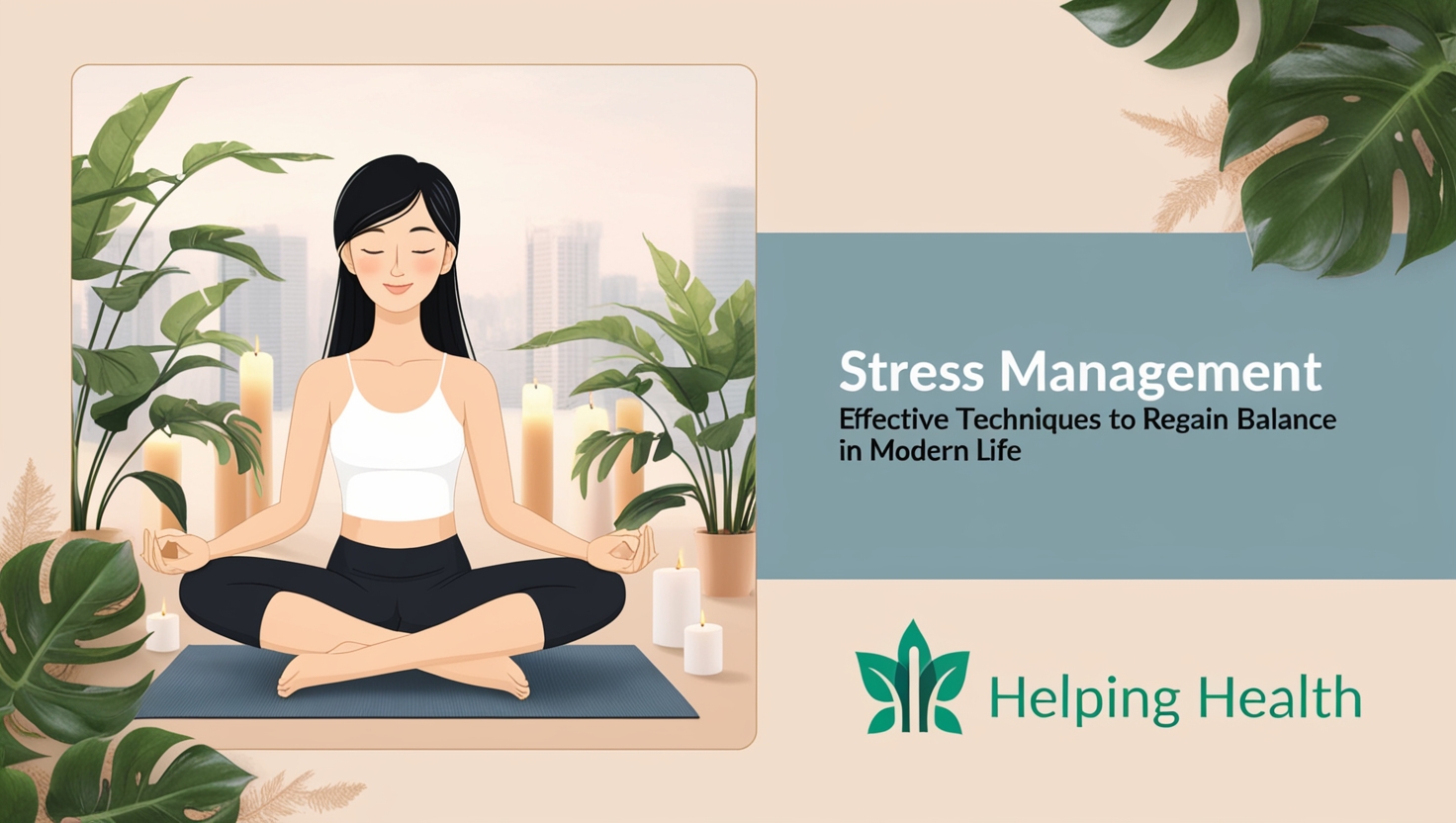
Stress Management: Effective Techniques to Regain Balance in Modern Life
Stress has become an unavoidable part of daily life. From work pressure and financial struggles to personal challenges and constant digital distractions, stress can affect both mental and physical health. While it is normal to feel occasional tension, unmanaged stress can lead to serious consequences such as anxiety, depression, high blood pressure, and sleep disorders.
The good news is that stress can be managed effectively with the right tools and lifestyle changes. In this guide,
we’ll explore practical, science-backed techniques for stress management that can help you restore balance, improve productivity, and enhance overall well-being.
Understanding Stress and Its Impact
Stress is the body’s natural response to challenges or demands. When we face pressure, our brain releases stress hormones like cortisol and adrenaline, triggering the “fight-or-flight” response. While short-term stress can boost alertness, prolonged exposure often leads to negative effects.
Common Symptoms of Stress:
-
Constant worry and racing thoughts
-
Irritability or mood swings
-
Trouble sleeping or insomnia
-
Muscle tension, headaches, or fatigue
-
Poor concentration and decision-making
Long-Term Effects of Chronic Stress:
-
Weakened immune system
-
Increased risk of cardiovascular diseases
-
Digestive issues like ulcers or IBS
-
Mental health challenges, including anxiety and depression
By identifying these signs early, you can take proactive steps to manage stress before it escalates.
Proven Stress Management Techniques
1. Deep Breathing Exercises
Deep, slow breathing reduces heart rate, lowers blood pressure, and calms the nervous system. Practicing diaphragmatic breathing for 5–10 minutes daily can significantly reduce stress.
Tip: Try the “4-7-8 technique”: inhale for 4 seconds, hold for 7, exhale for 8.
2. Mindfulness and Meditation
Mindfulness trains the mind to focus on the present moment instead of worrying about the past or future. Meditation techniques, including guided sessions and body scans, help lower cortisol levels, increase self-awareness, and improve resilience against stress.
3. Regular Physical Activity
Exercise is one of the most effective stress relievers. Physical activity releases endorphins—natural mood boosters—while also reducing fatigue and improving sleep.
Recommended activities:
-
Walking or jogging
-
Yoga and stretching
-
Strength training or dance workouts
4. Balanced Nutrition
Diet plays a major role in stress management. Excess sugar, caffeine, and processed food can worsen stress symptoms, while nutrient-rich meals support brain health and emotional stability.
Best stress-reducing foods:
-
Leafy greens (spinach, kale)
-
Omega-3 rich fish (salmon, mackerel)
-
Nuts, seeds, and whole grains
-
Herbal teas like chamomile or green tea
5. Quality Sleep
Poor sleep increases irritability and stress sensitivity. Creating a bedtime routine and maintaining a consistent sleep schedule improves emotional stability.
Tips for better sleep:
-
Avoid screens 1 hour before bed
-
Keep the room cool and dark
-
Practice relaxation techniques like meditation or journaling
6. Time Management Skills
Overloaded schedules create unnecessary stress. Prioritizing tasks, setting realistic goals, and learning to say “no” are powerful ways to reduce pressure.
Effective methods:
-
Break projects into smaller tasks
-
Use to-do lists or digital planners
-
Apply the “Pomodoro technique” for focused work sessions
7. Social Support and Communication
Strong relationships are essential for mental health. Talking to friends, family, or support groups provides emotional relief and different perspectives.
Pro Tip: If stress feels overwhelming, consider professional counseling or therapy.
8. Relaxation Techniques
Activities that calm the body and mind help reverse the stress response. Popular methods include:
-
Listening to calming music
-
Aromatherapy with lavender or eucalyptus
-
Practicing progressive muscle relaxation
9. Limiting Digital Overload
Constant notifications, social media, and work emails often add unnecessary stress. Setting healthy digital boundaries improves focus and relaxation.
Suggestions:
-
Schedule “tech-free hours” daily
-
Avoid checking emails right before sleep
-
Engage in offline hobbies like reading or gardening
10. Building Resilience with Positive Thinking
Adopting a positive mindset doesn’t mean ignoring problems but reframing challenges as opportunities for growth. Gratitude journaling and affirmations help train the brain to focus on solutions instead of stressors.
Stress Management for Different Situations
Workplace Stress
-
Take short breaks between tasks
-
Organize your workspace to minimize distractions
-
Communicate with supervisors about workload
Academic Stress
-
Create a study plan with balanced breaks
-
Use relaxation exercises before exams
-
Seek peer or mentor support
Home and Family Stress
-
Delegate household responsibilities
-
Spend quality time with loved ones
-
Practice patience and mindful communication
FAQs About Stress Management
Q1: Can stress ever be positive?
Yes, short-term stress can boost performance, but chronic stress is harmful.
Q2: How long does it take to see results from stress management techniques?
Some methods like deep breathing provide immediate relief, while habits like mindfulness and exercise show results over weeks.
Q3: Is professional help necessary?
If stress interferes with daily functioning, therapy or counseling is highly recommended.
Q4: Can diet alone reduce stress?
No, but balanced nutrition complements other stress management techniques.
Conclusion
Stress is inevitable, but suffering from it is not. By incorporating simple practices like mindfulness, exercise, balanced nutrition, and proper sleep, you can build resilience and restore calm in your daily life. Remember, managing stress is not about eliminating challenges—it’s about improving how you respond to them.
Start small, stay consistent, and watch as these techniques transform your mental health, productivity, and overall happiness.
